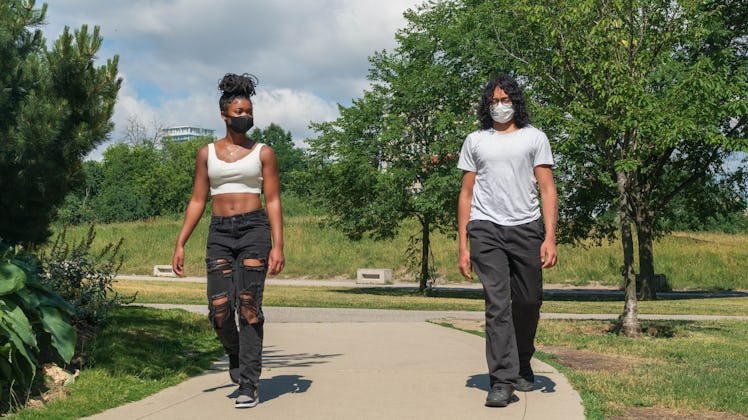With coronavirus cases continuing to surge around the country, it's more important than ever to take safety precautions like wearing a mask and social distancing. As of July 2020, rising COVID-19 cases have led numerous states to either pause or roll back their reopening plans, in addition to implementing new mask mandates. If you're wondering if you still have to wear a mask outside after coronavirus reopenings of outdoor spaces like patios, beaches, and parks, here's what experts recommend.
According to the guidance from the Centers for Disease Control and Prevention (CDC) as of July 16, everyone who's at least 2 years old should wear a cloth face covering when in public and when around people who don't live in their household. People should also social distance and maintain a minimum of 6 feet of distance from others, as the coronavirus is believed to spread primarily through respiratory droplets in person-to-person contact. Because COVID-19 can be spread by people who are asymptomatic and don't know they're infected, it's important to wear masks to protect others even if you don't have symptoms.
While many states now mandate mask-wearing in indoor spaces, you might be wondering if you should be wearing masks outdoors as well, even if it's not a requirement in your community. According to experts, you should wear a mask outside depending on the situation and how closely you'll be interacting with others. Kirsten Koehler, Ph.D, an associate professor of environmental health and engineering at Johns Hopkins' Bloomberg School of Public Health, tells Elite Daily that whether or not you need to wear a mask when you’re outside depends on if social distancing is hard to enforce, or if you'll be coming in close contact with other people while outside. “If you can stay away from people by not going on crowded bike paths or crowded running paths or something like that, then probably if you're out by yourself, you don't necessarily need to be wearing a mask," Koehler says.
Koehler warns that even though there is great ventilation and more opportunity to physically distance outside, you should always be prepared with a mask in case you do come in closer contact with another person. “I would have a mask with you in case you end up in a situation where you realize that you can't be as separated as you would like to be,” she recommends.
Vincent Racaniello, Ph.D, a microbiology and immunology professor at Columbia University's Irving Medical Center, previously told Elite Daily that because the virus primarily spreads through person-to-person contact, a good way to protect yourself is to keep your distance from others and avoid large groups of people.
"People are the source of the virus, so if you’re going for a walk and there’s no one around you, you’re not going to get infected because you need another person to either touch you or give it to you," Racaniello said.
In addition to continuing to practice social distancing, Koehler recommends taking extra precautions with your mask and avoiding touching your face as the weather gets hotter and a face covering might become more uncomfortable. "We've all noticed that it can be uncomfortable to wear masks [especially as it's gotten hotter]. Then you're tempted to want to mess with them and touch them constantly," she says. "Wash your hands before you put your mask on, put your mask on, try to leave it alone."
When you're done wearing a cloth mask at the end of the day, Koehler says to take it off without touching the front part of it and put it straight into the laundry to wash, making sure to wash or sanitize your hands afterward. If you can't wash your mask right away, put it in a paper bag for safekeeping and then wash your hands. For disposable masks, throw them away after you use them.
Numerous studies have shown that wearing a face covering can help slow the spread of the coronavirus. In short, if you're in an outdoors situation where you're unsure if you should be masked up, it's better to be safe than sorry and put one on just in case.
If you think you’re showing symptoms of coronavirus, which include fever, shortness of breath, and cough, call your doctor before going to get tested. If you’re anxious about the virus’s spread in your community, visit the CDC for up-to-date information and resources, or seek out mental health support. You can find all Elite Daily's coverage of the coronavirus here.
Experts cited:
Kirsten Koehler, Ph.D, associate professor of environmental health and engineering at Johns Hopkins Bloomberg School of Public Health
Vincent Racaniello, Ph.D, Higgins professor of microbiology and immunology at the Columbia University Irving Medical Center
